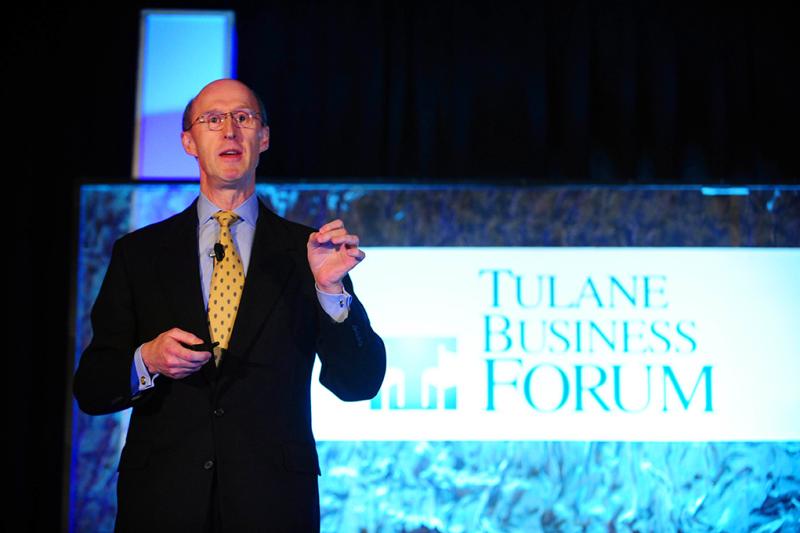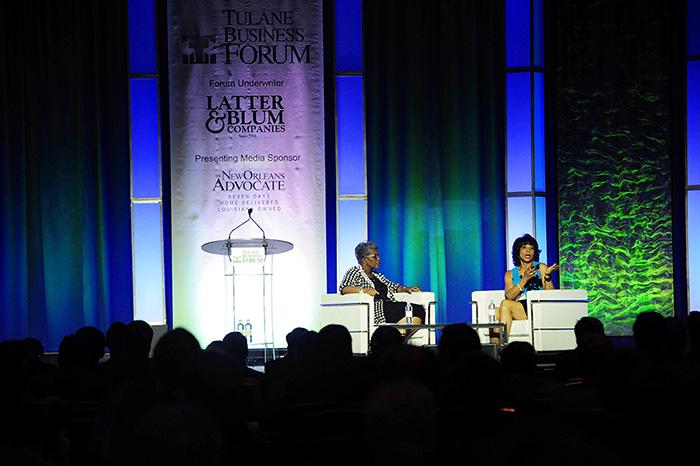Sazerac CEO shares homegrown success story as forum keynote speaker

Mark Brown, president and CEO of the New Orleans-based Sazerac Co., one of the world’s largest manufacturers of distilled spirits, doesn’t talk about his company very much.
“Our company is intensely private,” he told an audience at the 37th annual Tulane Business Forum on Friday (Sept. 9). “In fact, we had a lot of handwringing over whether we should make this presentation or not, but the connection between us and Tulane and New Orleans is very compelling, and if it’s an inspirational story, we’d love to share it with you.”
Brown, a 1990 MBA graduate of the A. B. Freeman School of Business, was the luncheon keynote speaker at the forum, an annual presentation of the Tulane Association of Business Alumni (TABA). With the theme "Purpose-Driven Business: How to Profit and Make a Difference," this year’s event attracted more than 700 business people from across the region to the Ernest N. Morial Convention Center, making it the largest Tulane Business Forum in over a decade.
Founded in 1850 and acquired by its current owners, the Goldring family of New Orleans, in 1948, the Sazerac Co. has grown dramatically in the last 25 years through a series of strategic acquisitions. With top-selling brands including Pappy Van Winkle, Fireball, Buffalo Trace and Southern Comfort, the Sazerac Co. is now the fifth largest spirits company in the world and the only American company in the top five.
“We do business in 112 countries, we’ve got 2,000 employees, and we’ve got nine manufacturing facilities,” Brown said. “We are the proud owners of 420 million bottles of bourbon and Canadian whisky, and we’re roughly capable of making a $3 billion acquisition if we put our minds to it.”
Brown closed his talk by paying tribute to his Tulane professors, including current business school faculty members John Trapani and Frank Jaster.
“I can tell you without fear of contradiction: no MBA from Tulane, no last 25 years with Sazerac,” Brown said. “Those professors made a big difference in the outcome of Sazerac and for me personally. The value of a great education is never to be underestimated.”

Prior to Brown’s talk, Deb Elam, chief diversity officer for GE and president of the GE Foundation, delivered a morning keynote presentation on diversity, leadership and philanthropy. In a conversation with Kim Boyle, partner at Phelps Dunbar in New Orleans, Elam said a diverse workforce is essential for GE to remain competitive.
“If you believe that talent and innovation and creativity — all the things we need to drive the bottom line — exist in diverse workforces across the globe, you’ve got to tap into that," said Elam, a New Orleans native. “If you have only a homogeneous workforce, you are missing out on getting talent.”
This year’s forum also included presentations by David Altig, executive vice president and chief of research with the Federal Reserve Bank of Atlanta; Alan Leventhal, chairman and CEO of Beacon Capital Partners, the company developing the World Trade Center building in New Orleans into a Four Seasons Hotel and Residences; Shannon Schuyler, principal, chief purpose officer and corporate responsibility leader at PwC US; and Trey Fayard, founder and CEO of GLO, a locally based airline that provides nonstop flights to destinations across the Mid South.
Interested in advancing your education and/or career? Learn more about Freeman’s MBA programs. Find the right program for you.
Other Related Articles
- Alumna leverages Freeman network to land dream job at Entergy
- Alumna recalls trailblazing career in business, ministry
- Students network their way through Manhattan in annual Real Estate Trek
- Futurist series highlights consumerization of health care
- Freeman partners with Leland to provide personalized coaching for Executive MBAs
- Snapping Back: Alumna is HP’s guardian against disruption
- Goes highlights growth, AI initiatives in ‘State of the School’ address
- ENFRA partners with Stewart Center to launch executive leadership program
